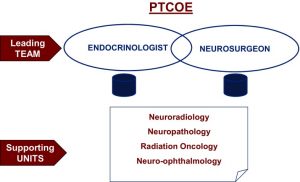From Lewis S Blevins, JR. M.D. co-founder – We see a lot of requests on social media from one patient to others, similar to “what do I ask the surgeon tomorrow?” While there are numerous questions to be answered regarding the tumor, procedure, hospital care, post-operative follow-up, etc., one critical set of queries to be considered relates to the experience of the operating surgeon. Research confirms that complication rates are lower and outcomes are better when experienced pituitary neurosurgeons perform the surgical procedure. Here is an article about what is a pituitary “center of excellence” and the sorts of things that qualify a surgeon to put tools into your head.
 The article, developed by the Pituitary Society and initially published in 2017, lays out the criteria necessary to guide the care of people with pituitary disease.
The article, developed by the Pituitary Society and initially published in 2017, lays out the criteria necessary to guide the care of people with pituitary disease.
The authors write that, among other things, there are no formal definitions of the criteria needed to be considered genuinely excellent. Significantly, they outline the general characteristics of a Pituitary Tumor Center of Excellence (PTCOE), the mission, targets, the basic requirements for excellence for neurosurgeons using transsphenoidal procedures, organization of a neurosurgical center for a PTCOE, experienced pituitary endocrinologist, and supporting units to support a PTCOE.
The following excerpt offers a summary of the article. You can click here to read the complete article
“The concept of a Center of Excellence has been promulgated in various fields of medicine to address public and professional concerns regarding the quality of care of a given group of patients. This concept has been found to be useful primarily in activities involving multidisciplinary teams and more often in teams that are composed of experts in surgical techniques and medical treatments [6–8]. In some centers treating pituitary tumors, high-level interdisciplinary groups are already developed and effectively function, but in most cases, these groups are self-appointed structures without formal acceptance by hospital managers, or health authorities, no by their colleagues, and there are no formal definitions of the criteria needed to be considered truly “excellent” [4]. If there are no explicit requirements for achieving a degree of excellence, patients’ outcomes cannot be accurately measured, and the fulfillment of the previously outlined goals cannot be determined. In addition, the evaluation and accreditation of such structures by external and independent bodies are not performed.
Despite efforts to foster improved adherence to the recommended standards being available, a major barrier to optimal care in patients with pituitary tumors is a delivery system that too often is fragmented, lacks clinical information capabilities, duplicates services, and is not well designed for the delivery of co-ordinated chronic care.
The relationship between quality and outcome has been intuitively affirmed by endocrinologists who have a “preferred pituitary neurosurgeon” to whom they refer patients. However, in a given hospital, efforts by endocrinologists or administrators for example to limit surgical procedures to a single surgeon, may encounter firm opposition by the neurosurgery staff stating that “a graduate in Neurosurgery can perform any intervention”. In such situations, surgeons perform all of the activities without sub specialization. In the absence of external guidelines generated and endorsed by authoritative bodies, the status quo is unlikely to change.”
Click here to read the complete article
© 2022 – 2024, J D Faccinetti. All rights reserved.
